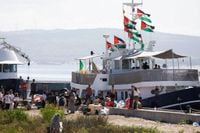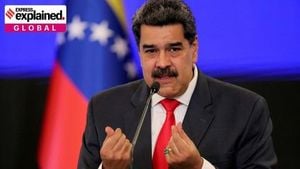As the sun rose over the Mediterranean on September 28, 2025, a convoy of about 50 vessels—known as the Global Sumud Flotilla—edged ever closer to the besieged Gaza Strip. Their mission: to break Israel’s long-standing naval blockade and deliver desperately needed medical supplies and humanitarian aid to Palestinians trapped inside a territory ravaged by war, famine, and disease. With less than 400 nautical miles to go, organizers announced that the flotilla could reach Gaza by September 30 or October 1, depending on the whims of the weather and the unpredictable tides of international politics.
Among the activists on board is Swedish climate campaigner Greta Thunberg, who has become a lightning rod for both support and criticism. Thunberg, speaking to the BBC’s Laura Kuenssberg while sailing off the Greek coast, pushed back against accusations that the flotilla is little more than a publicity stunt. "I don't think anyone would risk their life for a publicity stunt," she insisted, referencing the real dangers faced by those aboard. Her words echoed the sentiments of many on the flotilla, who see their journey not just as a delivery of aid, but as a message of solidarity: "When our governments fail to step up, the people will step up."
The Global Sumud Flotilla’s route has been anything but smooth sailing. Israeli authorities have ridiculed the mission, dismissing the vessel Thunberg traveled on in June as a "selfie yacht." Yet the activists remain undeterred. Their stated aim, as Thunberg put it, is to "break Israel's illegal and inhumane siege on Gaza by sea." Israel, for its part, has tightly controlled the waters bordering Gaza for years, enforcing a blockade it says is necessary to prevent weapons and supplies from reaching Hamas.
International aid agencies have repeatedly tried to get food and medicine into Gaza, but Israel has restricted the flow, citing security concerns. According to the BBC, Israel claims these measures are meant to stop supplies from falling into the hands of Hamas, though it has approved some deliveries via a U.S.-backed aid agency. However, the humanitarian situation inside Gaza has grown dire. In August 2025, a UN-backed body confirmed the presence of famine in the enclave, and the UN’s humanitarian chief attributed it directly to what he called Israel’s "systematic obstruction" of aid. Israeli Prime Minister Benjamin Netanyahu dismissed this characterization as an "outright lie."
The flotilla’s journey has also been marked by danger and uncertainty. Earlier in September, two of its vessels reportedly came under suspected drone attack outside the Tunisian port of Sidi Bou Said—though Tunisian authorities disputed these claims. Just days ago, another suspected drone strike off the coast of Crete prompted Spain and Italy to dispatch naval ships to provide protection. The Greek Navy, which had previously accompanied the flotilla in international waters, has since departed, leaving the activists with only the Italian and Spanish escorts as they approach the final leg of their journey.
Ross Ykema, an activist from the Netherlands, summed up the mood on board in a video message shared on social media: "The only thing between us and Gaza right now is the sea." That sea, however, is fraught with peril. Israel has made it clear it will not allow the flotilla to reach its destination, and has a track record of intercepting ships bound for Gaza. In June 2025, Thunberg and 11 other activists were detained after their boat was intercepted by Israeli authorities. They were held in Tel Aviv for a day before being deported to France. Thunberg later accused Israel of "illegally kidnapping" the activists while they were still in international waters—a claim Israel rejects, insisting it was enforcing the maritime blockade around Gaza.
These actions by Israeli forces have drawn sharp criticism from international observers and human rights advocates. According to Al Jazeera, such interceptions and deportations are widely condemned as acts of piracy. Yet Israel maintains that its measures are necessary to prevent arms smuggling and to uphold its security concerns, especially given the ongoing conflict with Hamas and other armed groups in Gaza.
The context on the ground in Gaza is grim. Since March 2, 2025, Israel has fully sealed Gaza’s crossings, blocking nearly all food and aid convoys—a move that has worsened already catastrophic famine conditions. Occasional supplies that do make it in are sometimes looted by armed groups, whom Gaza authorities accuse Israel of shielding. According to Gaza’s health authorities, more than 66,000 Palestinians—most of them women and children—have been killed in Israeli strikes since the conflict escalated in October 2023. The devastation has left much of the enclave uninhabitable, with starvation and disease spreading rapidly among the population.
For many on the flotilla, these numbers are not just statistics—they are a call to action. Thunberg and her fellow activists believe that their mission is about more than just delivering aid; it’s about bearing witness to a humanitarian crisis and demanding accountability from those in power. As Thunberg asked pointedly, "Why would they attack a peaceful humanitarian mission aiming to bring humanitarian aid to a starving population?" She accused Israeli officials of making "baseless threats" that violate international law, underscoring the tension between the activists’ stated humanitarian goals and the geopolitical realities of the region.
Meanwhile, the flotilla’s progress has become a focal point for international attention, with supporters and detractors alike watching closely. The coalition behind the mission posted on X (formerly Twitter), "Time moves and the flotilla moves with it—every minute takes Global Sumud Flotilla nearer to Gaza and the justice it deserves." Spokesperson Wael Naouar, representing the flotilla’s Maghreb fleet, confirmed that arrival in Gaza could happen as soon as September 30 or October 1, depending on weather conditions.
The situation remains tense as the flotilla draws nearer to Gaza. Israel has not yet commented on the most recent drone attacks, but its stance on the blockade and its willingness to use force to prevent breaches are well documented. For the activists, the risks are real, but so too is their resolve. As Thunberg put it, "No one would risk their life for a publicity stunt."
As the ships press forward, the world watches and waits to see whether the Global Sumud Flotilla will succeed in reaching Gaza—or whether it will become yet another chapter in the long, fraught history of humanitarian efforts in the region. One thing is certain: the journey has already sparked a global conversation about the limits of activism, the responsibilities of governments, and the enduring human cost of conflict.




